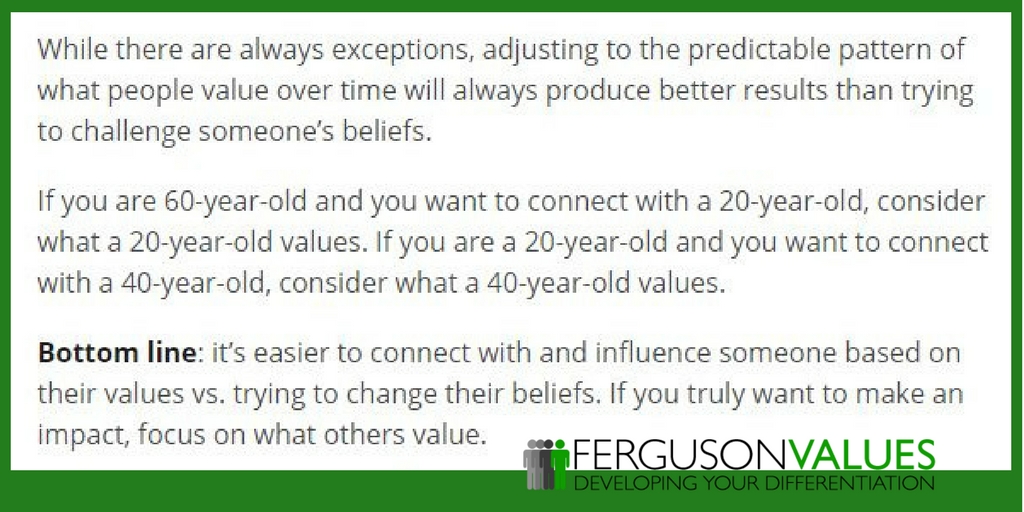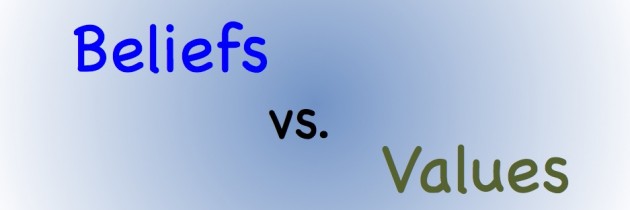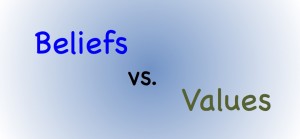Beliefs vs. Values? The Best Way to Make an Impact.
Our beliefs are a a reflection of our worldview and determine how we interact with others. They also dictate how we approach any topic.
- Some believe we need to do everything possible to protect the environment. Others believe the whole topic is irrelevant.
- Some believe we should go out of our way to help the disadvantaged. Others believe everyone makes they’re own bed and should lie in it.
- Some believe in equal pay for everyone. Others believe in pay for performance.
Beliefs are an emotional response to what we view as right and wrong, what is desirable and valuable and what is not. We then look to support our emotional investments by rational explanations.

The problem with beliefs is that they are difficult to change. You can provide tons of data to support your beliefs, but that doesn’t mean others will change their beliefs. Even engaging a person’s family and friends doesn’t guarantee they will change their beliefs (though these tend to be the best source of influence). In fact, the harder you push against someone’s beliefs, the more ingrained they tend to become.
Yet, an incredible amount of time, money, and resources are continually invested by thousands of organizations in trying to change the beliefs of others. What a waste! If we were to measure the Return on Investment (ROI) to change the beliefs of others, I suspect it’s infinitesimally small, something like less than 1% of 1%.
A far more productive approach is to focus on values.
It’s actually easy to identify what someone else values. Just observe the decisions they make and the actions they take. If we then connect on a specific value, we’ve opened the door for dialogue.
- If someone values the pleasure of boating, then they’re likely open to exploring ways to preserve their favorite lake.
- If someone values the love they receive from their dog, then they’re likely open to discussing how to reduce the number of abandoned dogs in their community.
- If someone values conquering tough challenges, like climbing Mount Everest, then they’re likely open to investigating how to conquer tough challenges in their community.
In other words, the best way to influence someone else is to connect on what they value, not on what they believe.
Now, one of the secrets to connecting on what others value is to understand how this shifts over time.
The Shift in Values Over Time
 Consider the behaviors of the following groups, based on what they value:
Consider the behaviors of the following groups, based on what they value:
- Many young entrepreneurs willingly choose to work 80-hour weeks because they value the business they are building, and the notion of making lots of money.
- Many parents choose to scrimp and save, or work an extra job, to get their kids through college because they value the prospects that come with a college education.
- Many middle-aged employees choose to contribute regularly to a retirement fund because they value the idea of retiring comfortably.
- Many older adults choose to eat healthy and exercise because they value the idea of leading a long and healthy life.
Of course it’s easy to point out the delusion in every one of these scenarios. The entrepreneur never makes much money. Parents find their college educated kids still living at home. Employees discover their retirement fund has suffered a major loss due to bad investments. And healthy older adults die suddenly.
If you have any of these negative thoughts, then either your beliefs or values are not aligned with the various groups. As mentioned earlier, it is difficult to adjust your beliefs, but it is possible to change your approach based on values.
As economist Harry Dent Jr. outlined in his 1994 book The Great Boom Ahead: 20-year-olds think and act like 20-year-olds; 40-year-olds think and act like 40-year-olds; and 60-year-olds think and act like 60-year-olds.
What we value changes over time. It’s predictable.
When we’re young, we value getting our first job, or maybe starting our own business. Then we meet someone special and we value starting a family and getting our first house. As the kids grow up, we then value a college education to help prepare our kids for a solid career. Then as we get older, we begin to value the importance of having a retirement nest egg. And as we near the end of life, we value those who speak of a better life that comes next.
While there are always exceptions, adjusting to the predictable pattern of what people value over time will always produce better results than trying to challenge someone’s beliefs.
If you are 60-year-old and you want to connect with a 20-year-old, consider what a 20-year-old values. If you are a 20-year-old and you want to connect with a 40-year-old, consider what a 40-year-old values.
Bottom line: it’s easier to connect with and influence someone based on their values vs. trying to change their beliefs. If you truly want to make an impact, focus on what others value.
—————————–
How have others connected well with you?










